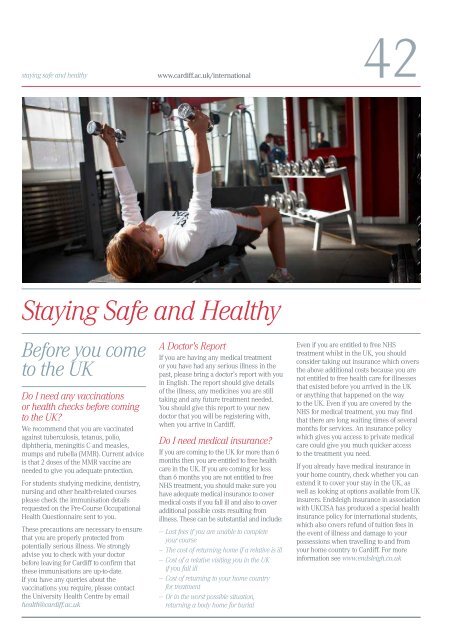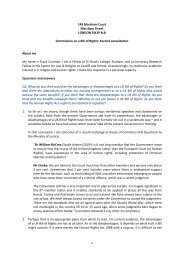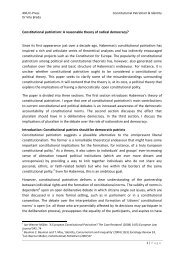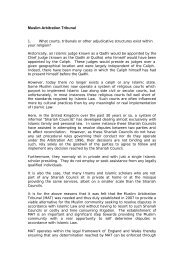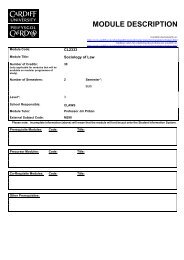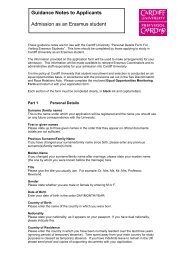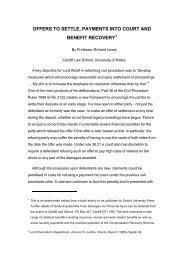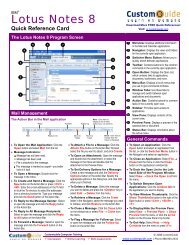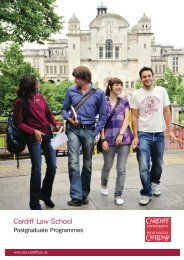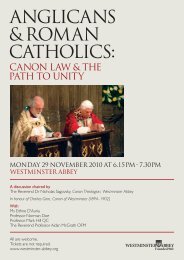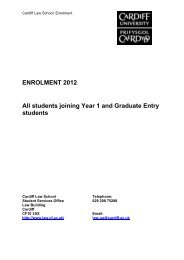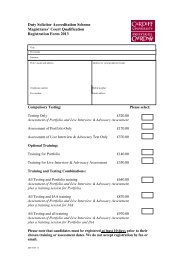Guide for International Students 2011 - Cardiff Law School
Guide for International Students 2011 - Cardiff Law School
Guide for International Students 2011 - Cardiff Law School
Create successful ePaper yourself
Turn your PDF publications into a flip-book with our unique Google optimized e-Paper software.
staying safe and healthy4243www.cardiff.ac.uk/internationalstaying safe and healthywww.cardiff.ac.uk/internationalHealth care in the UKStaying Safe and HealthyBe<strong>for</strong>e you cometo the UKDo I need any vaccinationsor health checks be<strong>for</strong>e comingto the UK?We recommend that you are vaccinatedagainst tuberculosis, tetanus, polio,diphtheria, meningitis C and measles,mumps and rubella (MMR). Current adviceis that 2 doses of the MMR vaccine areneeded to give you adequate protection.For students studying medicine, dentistry,nursing and other health-related coursesplease check the immunisation detailsrequested on the Pre-Course OccupationalHealth Questionnaire sent to you.These precautions are necessary to ensurethat you are properly protected frompotentially serious illness. We stronglyadvise you to check with your doctorbe<strong>for</strong>e leaving <strong>for</strong> <strong>Cardiff</strong> to confirm thatthese immunisations are up-to-date.If you have any queries about thevaccinations you require, please contactthe University Health Centre by emailhealth@cardiff.ac.ukA Doctor’s ReportIf you are having any medical treatmentor you have had any serious illness in thepast, please bring a doctor’s report with youin English. The report should give detailsof the illness, any medicines you are stilltaking and any future treatment needed.You should give this report to your newdoctor that you will be registering with,when you arrive in <strong>Cardiff</strong>.Do I need medical insurance?If you are coming to the UK <strong>for</strong> more than 6months then you are entitled to free healthcare in the UK. If you are coming <strong>for</strong> lessthan 6 months you are not entitled to freeNHS treatment, you should make sure youhave adequate medical insurance to covermedical costs if you fall ill and also to coveradditional possible costs resulting fromillness. These can be substantial and include:— Lost fees if you are unable to completeyour course— The cost of returning home if a relative is ill— Cost of a relative visiting you in the UKif you fall ill— Cost of returning to your home country<strong>for</strong> treatment— Or in the worst possible situation,returning a body home <strong>for</strong> burialEven if you are entitled to free NHStreatment whilst in the UK, you shouldconsider taking out insurance which coversthe above additional costs because you arenot entitled to free health care <strong>for</strong> illnessesthat existed be<strong>for</strong>e you arrived in the UKor anything that happened on the wayto the UK. Even if you are covered by theNHS <strong>for</strong> medical treatment, you may findthat there are long waiting times of severalmonths <strong>for</strong> services. An insurance policywhich gives you access to private medicalcare could give you much quicker accessto the treatment you need.If you already have medical insurance inyour home country, check whether you canextend it to cover your stay in the UK, aswell as looking at options available from UKinsurers. Endsleigh insurance in associationwith UKCISA has produced a special healthinsurance policy <strong>for</strong> international students,which also covers refund of tuition fees inthe event of illness and damage to yourpossessions when travelling to and fromyour home country to <strong>Cardiff</strong>. For morein<strong>for</strong>mation see www.endsleigh.co.ukYour PersonalSafety<strong>Cardiff</strong> is a safe city, but like all cities youhave to be sensible. The vast majority ofinternational students enjoy a positive andrewarding experience during their stayin <strong>Cardiff</strong>. The suggestions that follow areintended to advise, not to alarm. Much ofthe advice is common sense, but it canmake a real difference.— If you go out alone at night make suresomeone knows where you are going.— When you go out in a group at night staywith them; there is safety in numbers.— Keep to public routes that are well lit atnight. Don’t take risky alternative darkroutes even if in a hurry.— Carry a personal safety alarm; availableat discounted prices from the UniversitySecurity Centre.— If using a taxi, use a recognised taxirank or try and pre-book with a reputabletaxi firm (see page 35).— If travelling alone in a taxi, always sitin the rear seat behind the driver.Further in<strong>for</strong>mation and advice areavailable from the Security Centre which isbased on Park Place, opposite 51 Park Place(number 35 on the campus map).Security on campusThe University Security Centre provides24-hour security cover <strong>for</strong> the Universitycampus and halls of residence.A comprehensive CCTV camera systemoperates throughout the Universitycampus, including the large residentialsites. The cameras, in conjunction withtwo-way radios, are used to great effect,directing security staff to incidents, andthe Centre works in close liaison withthe police.Arriving in a new country is a very busy timeand there are lots of changes to cope with.Please make sure that you don’t <strong>for</strong>get totake care of yourself when you are adjustingto the unfamiliar UK food, different climateand the emotional strains of being away fromhome.How do I register with a doctor?In the UK, non-emergencies are dealt within a surgery by a doctor known as a GeneralPractitioner (GP). You need to register with adoctor be<strong>for</strong>e you are treated. So you mustdo this within the first week of your arrivalin the UK. You do not pay to register withor to consult with a doctor. Women cansee a female doctor. GP appointments areshort - only 5 minutes or 10 minutes, butyour GP will refer you to a consultant - anexpert - if you need extra or special treatment,like an operation. Names and addresses ofdoctors can be obtained from the UniversityHealth Centre or www.cardiff.ac.uk/osheu/healthcentre/gpdentWhere can I find a dentist?Although dental treatment is available on theNHS, it is not always free. You may receivea dental health check up without beingcharged but additional dental treatmentwill be payable depending on individualcircumstances. You can choose which NHSdentist you want to be registered with (it doesnot need to be the dental practice closest toyour residence), but you need to be registeredwith a dentist be<strong>for</strong>e you receive treatmentfrom them. To find a list of NHS registereddentists (these are considerably cheaperthan private dentists) see www.cardiff.ac.uk/osheu/healthcentre/gpdentWhere can I get further healthadvice?If you or your family are feeling ill, NHSDirect can be a helpful source of advice andin<strong>for</strong>mation. The NHS Direct website andtelephone service can provide in<strong>for</strong>mationabout the provision of local services, suchas doctors’ surgeries, dentists, opticiansand pharmacies. NHS Direct also providesa confidential health care advice andin<strong>for</strong>mation service 24 hours a day.Tel: 0845 46 47 www.nhsdirect.nhs.ukAm I entitled to free medicaltreatment in the UK?If your course is 6 months’ duration or moreyou will qualify <strong>for</strong> National Health Service(NHS) treatment. You must also register witha doctor (see above).This is the UK’s state health service whichprovides treatment on a wide range of healthcare services. If you are entitled to NHStreatment the following services will be freeof charge:_ Medicine you require on prescription - this isfree in Wales (but not throughout the UK)_ Consulting a doctor/General Practitioner/GPand most other GP services (e.g. visiting adoctors’ surgery/clinic)_ Treatment in a hospital (both emergencyand non-emergency treatment)You are likely to pay <strong>for</strong>:_ Some GP services (e.g. vaccinations <strong>for</strong> traveland getting a sickness certificate)_ Dental treatment_ Optical treatment (you can get free andreduced price optician services throughthe University’s <strong>School</strong> of Optometry)_ Any illness or conditions which existedbe<strong>for</strong>e you arrived in the UK<strong>Cardiff</strong> University’s StudentHealth CentreThe Student Health Centre is available <strong>for</strong> useby all <strong>Cardiff</strong> University students and offersservices including family planning, holidayvaccination in<strong>for</strong>mation, wart and verrucaclinics and general health enquiries.Should you be unwell, have difficulties withyour studies, or experience personal problemsyou are encouraged to seek help at theearliest opportunity. The practice nursesoperate a “drop in” service where you willgenerally be seen within 15 minutes of arrivaland an appointment can be made with thedoctor, if required. The Student HealthCentre is not open at the weekend orevenings, which is why it is essential thatyou register with a GP.Further in<strong>for</strong>mation on the Student HealthCentre and topical health issues can be foundon the webwww.cardiff.ac.uk/osheu/healthcentre


